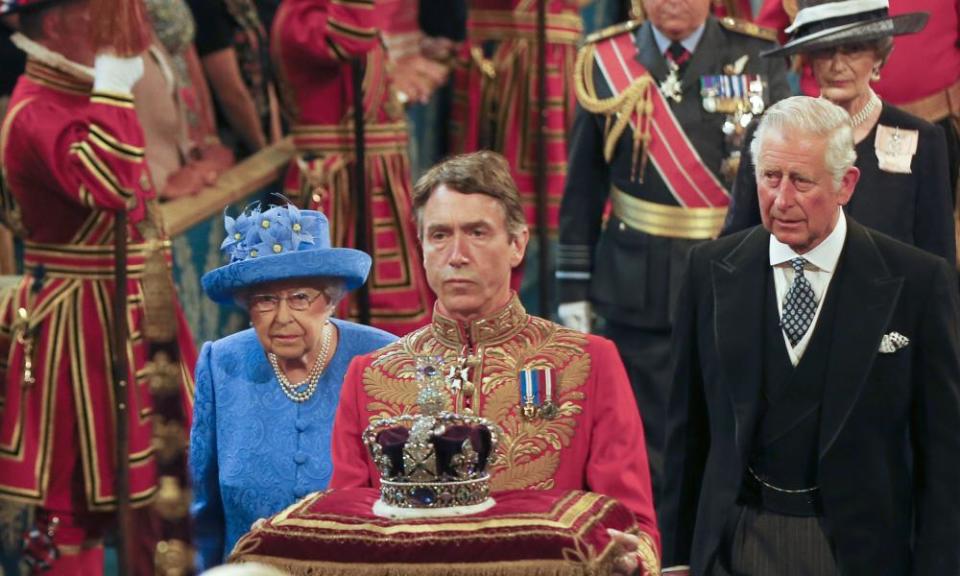The Queen’s speech has made Brexit Britain an international laughing stock | Rafael Behr

The pageantry can be depicted as splendid or ridiculous, according to taste. Black Rod, the arrival of Her Majesty’s crown in its own car; the cap of maintenance borne on its special ceremonial millinery pole – the whole spectacle testifies to the venerability and inflexibility of parliament. The Queen’s speech performance encapsulates the best and the worst of our legislative arrangements. It is easily mocked, sometimes with republican rage but mostly with affection.
And yet there was a farcical component to yesterday’s proceedings that had nothing to do with the fancy costumes and archaic language. It was not the form of the occasion that invites scorn but rather its formal admission of an absurdity: that Britain intends, in the course of this new parliament, to legislate itself out of the European Union without having achieved anything remotely resembling a credible plan for national prosperity on the other side.
Much commentary over the past 24 hours has concentrated on the great chunks of Tory manifesto that have been expunged from the government agenda. That is a practical response to the loss of a parliamentary majority; and, while humiliating for the prime minister, it is not constitutionally outrageous. It is expedient to present MPs with a programme that has at least some prospect of being enacted – a category that plainly doesn’t include new grammar schools and enforced cashing-in of housing equity to pay for social care.
Besides, the whole Queen’s speech exercise is predicated on the assumption that Theresa May commands a majority in the House of Commons when her arithmetic advantage is wafer thin. Talks with the Democratic Unionist party have yet to yield any proof of a reliable partnership. In terms of confidence and stability, the continuing haggling behind closed doors furnishes only cause to doubt the prime minister’s effectiveness in negotiation – the single most essential skill that we need her to demonstrate in the coming years.
And yet it is wrong to depict this Queen’s speech as thin, lacking content. It contained eight bills relating to Brexit. It’s just that one of those – the proposed absorption of European rules into UK statute to facilitate subsequent amendment or repeal – is such a monstrously complicated task, requiring high levels of technical expertise and close scrutiny, it is hard to imagine parliament having the capacity to do much else over the next two years. At least not if Brexit is to be handled responsibly.
But what prospect is there of that happening? We had a referendum campaign in which the practical implications of withdrawal from the EU were misrepresented or ignored. A year later we had a general election, called by the prime minister as an explicit request for a mandate to conduct Brexit. Again, the substance of the essential question – Brexit on what terms exactly? – was not debated. The electorate withdrew May’s majority and, by extension her mandate. Yet she presses on as if nothing has changed.
On Monday David Davis, the Brexit secretary, led his negotiators into their first session with their EU counterparts, led by Michel Barnier. The only measurable outcome was total capitulation by the UK side on the question of “sequencing” for the talks ahead. The EU27 insisted that matters concerning the reciprocal rights of expat citizens, the method for calculating the UK’s continuing financial obligations, and the status of the Irish border be settled upfront. Only once the terms of divorce can be agreed will there be discussion of Britain’s post-EU trading arrangements. The government had intended to dispute this timetable – but promptly folded.
Article 50 is activated. The clock is counting down, and the pretence that May might be prepared to walk away without a deal is melting in the midsummer heat. It was always a bluff. It was called on day one.
A majority of MPs attending the ceremony know the UK is unprepared for the negotiations ahead, that the government’s hand is weak and its strategy incoherent. Many of them, perhaps also a majority, know that the whole enterprise is a tragic folly – that the act of quitting the EU will not provide practical remedies for the grievances that fuelled support for the leave side last year. Few say so aloud.
A Queen’s speech dominated by Brexit bills is not a practical agenda for the future, it is a litany of damage to be limited. But to say as much amounts to a kind of heresy in domestic politics. It is lese-majesty where the “will of the people”, expressed in last year’s referendum, is sovereign.
The danger is obvious, to anyone watching from the outside. Ever deeper into national denial we plunge, while the world looks on aghast at a once sensible country affirming an act of collective self-harm with all the state pomp it can muster. Our parliament is an international laughing stock today, and not because of the silly wigs or the funny hat on a stick.

 Yahoo News
Yahoo News 